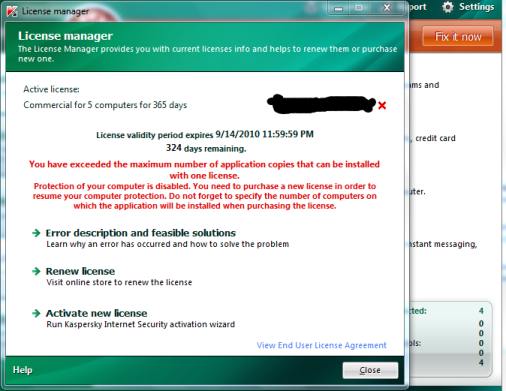Update: This was written in 2009, but it’s been over a decade and ever since having this experience, I’ve kept to free solutions. Though it admittedly helped that Microsoft essentially includes free basic virus detection in Windows.
I’ve been hooked on Kaspersky for a while now. Periodically we’d have something that slipped by some of the free anti-virus programs, and since Kaspersky and NOD32 were the only strongly recommended ones out there that were low on bloat, I tried them both and settled on Kaspersky.
This year, we grabbed a 5 user license for Kaspersky Internet Security. Some of the family’s been switching to Mac’s, so we only needed 4 licenses for the remaining PC’s. It was a bit pricey for the license from the Kaspersky website (buying a couple 3-user packs from Future Shop, Best Buy, or London Drugs when they go on sale would have been cheaper). In any case, we still had 1 left over.
You might imagine my surprise when today I found this message on one of our machines though:
So let me get this straight… We have a 5 user license, are only using 4, and are somehow over our limit?!
Let me be clear, we haven’t done anything to even remotely encourage an activation problem. Kaspersky was installed ONCE on each of these machines (there were no reinstalls or anything). I could see it if… you know… we were reformatting and reinstalling every week, but there’s absolutely no reason that we should be having these issues.
I sent a message to Kaspersky, but it’s supposed to take 2 days to receive a response.
In the meantime, virus protection on that computer is disabled. No, not just updates, the entire program is disabled.
I guess this really begs the question… what are we paying for?
In a free vs paid antivirus comparison, shouldn’t paid come out ahead?
I like math, so let’s do some:
It’s Sunday, and we’re looking at Tuesday before we get a response. We’ll give Kaspersky the benefit of the doubt and assume they fix it some time that day. That’s 3 days that Kaspersky’s not working, so we can say that Kaspersky works to “protect the computer” 362 out of 365 days of the year, or 99.17% of the time. The free ones don’t de-activate themselves on a whim, so we’re looking at 100% from them.
So we’re paying over $100 for the potential to have less uptime.
That’s like paying a doctor extra to close his eyes while he does surgery on you.
—-
Thanks Kaspersky. Our next anti-virus software will be a free solution.